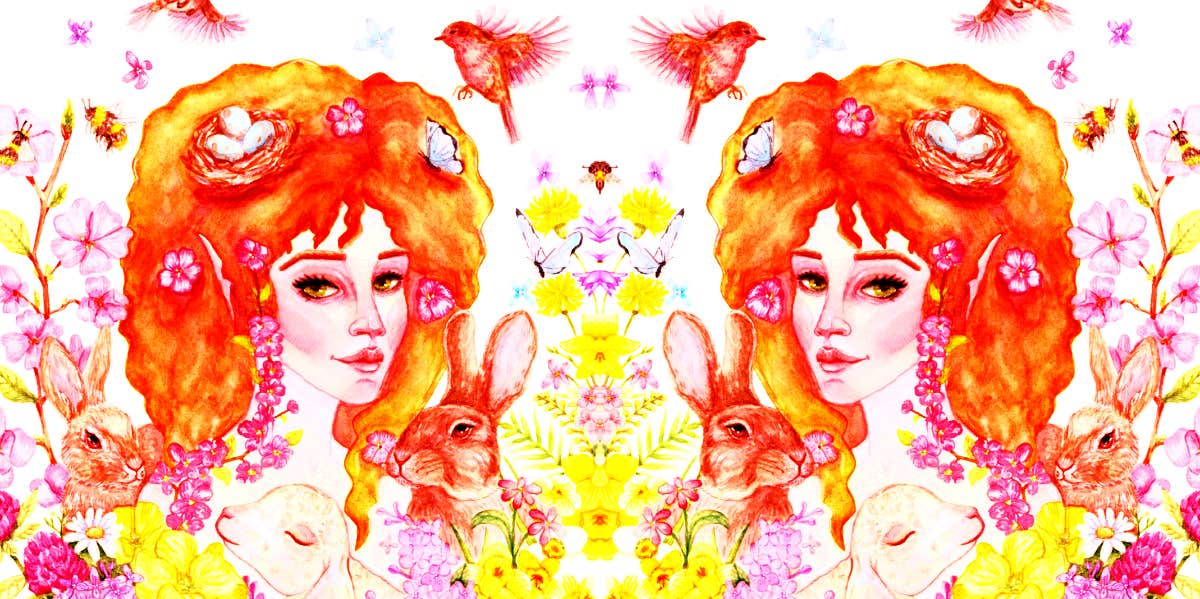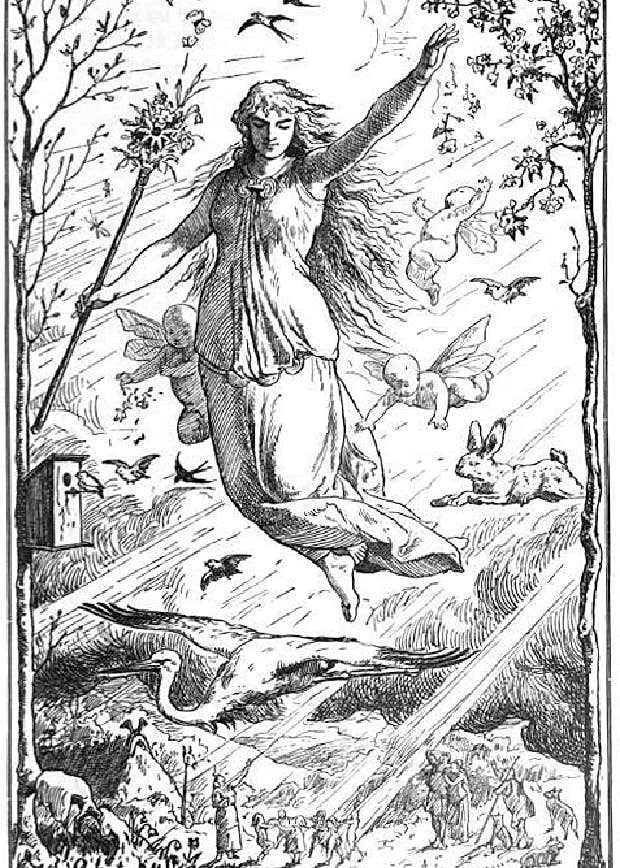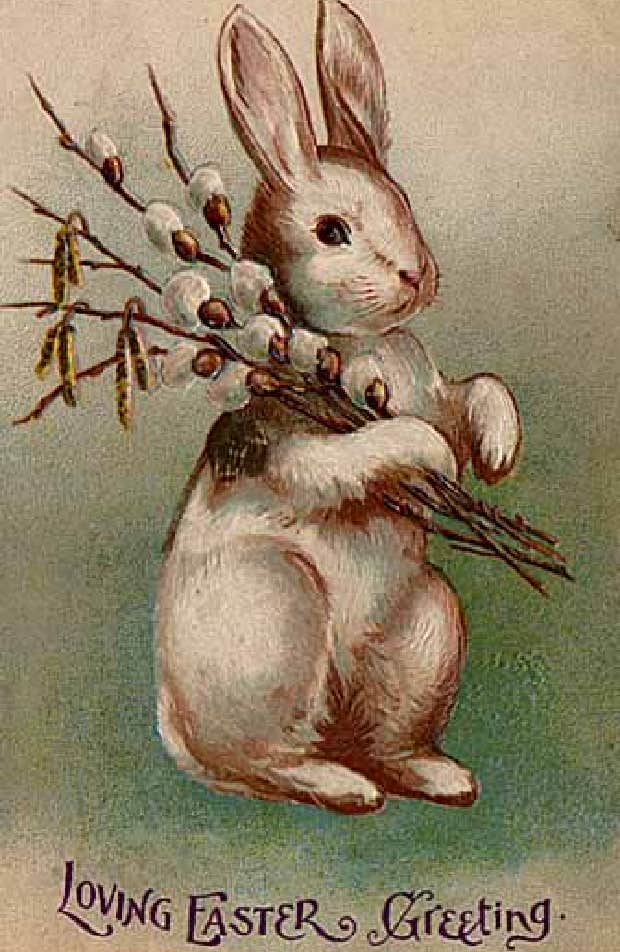The Pagan Reason We Celebrate Easter With Colored Eggs & Bunnies
It all starts with a Pagan goddess named Ēostre.
 zinziber.art / Shutterstock
zinziber.art / Shutterstock Easter arrives this year on Sunday, April 17, 2022, but if you think Easter started as a Christian holiday, think again.
The history and origins of how Easter began aren't rooted in what Christians know as Resurrection Sunday, but rather, as part of the lexicon of Pagan holidays and traditions.
Even as Christians celebrate the day of Jesus Christ's resurrection, people of other faiths and religious traditions which existed for millennia before Christianity was established celebrate their own stories of gods and goddesses being brought back to life again after death.
From the Egyptian god Osiris to the Greek god Dionysus, among others, resurrection and rebirth have been a fairly common theme among religions and mythology.
The Story of Pagan Easter Is About Pagan Goddess Ēostre
Easter's meaning and traditions are closely connected to paganism. As stated in The Guardian, "The general symbolic story of the death of the son (sun) on a cross (the constellation of the Southern Cross) and his rebirth, overcoming the powers of darkness, was a well worn story in the ancient world. There were plenty of parallel, rival resurrected saviours, too."
In fact, Easter is named after Ēostre, a pagan goddess who was worshiped for centuries before Christ.
Eostre was the Anglo-Saxon goddess of spring and fertility, from whom we get the word estrogen. She was believed to usher in spring every year, thereby resurrecting the earth from the dead of winter into the new life of spring.
Ostara is a Pagan festival honoring Eostre that coincides with the Spring or Vernal Equinox on March 21, celebrating the renewal of life on Earth and marking the time when the amount of daylight is equal to the amount of nightfall.
Jacob Grimm’s "Deutsche Mythologie" explains that the idea of resurrection was incorporated in the Ostara celebration, as Eástres' meaning and power could be easily adapted by the resurrection of Jesus Christ.
In a further effort to aggressively Christianize the pagan population, the Catholic Church "taught" them that the resurrection of their god happened on Easter, thereby claiming the Pagan holiday as a Christian one. That is why, to this day, you will encounter many Christians who mistakenly assume this holiday has purely Christian origins, and who may even feel insulted when anyone challenges this belief.
Pagan Easter Traditions
Easter itself is not a Pagan holiday. Christians celebrate Easter as the day of Jesus Christ's resurrection. And even though the feast of Jesus's Resurrection coincides with pagan celebrations, that doesn’t mean it's wholly derived from pagan traditions.
That said, there are many "traditional" Easter activities that come from pagan practices, rites and stories.
1. Easter Ham
One of the reasons ham is part of Easter dinner comes from the pagan lore of Tammuz, a man who was killed by a wild pig. Pagans celebrated by eating a pig to honor Tammuz.
But to mourn his death, the pagans gave the tradition of not eating meat for 40 days, which is now part of Lent, and then after every year on the first Sunday, and after the first Full Moon from the spring equinox, which is the kind of timing Easter follows.
2. Easter Eggs and Easter Egg Hunts
According to Pagan folklore, one year Ēostre was late coming in and the snow didn't melt. This made it hard for the birds to find food. One little bird broke its leg while digging through the deep snow. Showing mercy for the bird, Ēostre turned it into a rabbit so it could hop on top of the snow.
 Photo: Eduard Ade, Public domain, via Wikimedia Commons
Photo: Eduard Ade, Public domain, via Wikimedia Commons
She knew the rabbit still had the heart of a bird, so she allowed it to continue laying eggs — all of which would now boast the glorious colors of spring. It, therefore, became a tradition for families to paint Easter eggs in honor of their goddess and in gratitude for the spring.
It was only centuries later that the tradition of "hiding" eggs grew. Many scholars believe this practice was a way for pagan families and children to worship Ēostre without suffering persecution by the Catholic Church, which had criminalized paganism.
Decorating eggs was also a pagan tradition. When life began to blossom in nature, pagans decorated eggs to celebrate this time of rebirth and then gift the eggs to family and friends.
The easter egg hunt also comes from pagan traditions, as the pagans used eggs in their celebration of Eástre, having to hunt for the eggs and use what they could find.
3. Easter Bunnies
In addition to her having been said to turn the bird into a rabbit, Eástre has often been depicted with a hare because she was said to bring light and fertility, which the hare represents.
 Photo: ItsLassieTime, Public domain, via Wikimedia Commons
Photo: ItsLassieTime, Public domain, via Wikimedia Commons
4. Hot Cross Buns
While many people enjoy hot cross buns, which they believe are meant to symbolize the crucifixion of Jesus Christ, on Easter, buns decorated with a cross were also prepared by Pagans celebrating Ostara. For followers of the goddess, the cross represents the four seasons and the four main phases of the moon.
5. Easter Baskets
For Christians, giving eggs out at Easter celebrates new life, as the egg is a symbol of the tomb where Jesus was placed after he was taken down from the cross. Cracking an easter egg open represents Jesus's resurrection.
In Orthodox traditions, they paint the eggs red to symbolize Jesus's blood that was shed on the cross.
But the tradition of decorating eggs for Easter actually dates back to the 13th century. Eggs were formerly a forbidden food in the Lenten season. Therefore, people didn't want to waste them, instead painting and decorating them to mark the end of Lent.
Easter eggs and Easter baskets are German traditions that made their way to the U.S. in the 1700s, when German immigrants settled in Pennsylvania.
In the German tradition, children would make nests for the egg-laying hare, named Osterhase, to leave its colorful eggs in. Children who planned to be good throughout the year would do this and be rewarded with Osterhase's colorful eggs.
As the tradition spread across the U.S., the magical hare was then changed to the Easter bunny, whose morning deliveries were expanded to chocolate eggs, candy, and gifts; instead of children making a nest, the eggs would come in decorated baskets.
Easter and Christmas are Not Pagan Holidays, Even If They Incorporate Pagan Traditions
Easter and Christmas aren't technically Pagan holidays, but they occur on the same days as pagan festivals and have similarities in the traditions of each.
Pagan traditions remained as Christianity took over, because Christians actually found the pagan traditions special.
That's why many Christian holidays fall around the same time as many Pagan festivals — Easter being on the same day as the Pagan spring festival Ostara, Christmas occurring on the same day as the Pagan winter festival Saturnalia, which is the celebration of the birth of the Sun god.
Though some mistakenly believe so, Easter does not mean Ishtar. However, the original celebration of Easter was named Ishtar, after the Assyrian and Babylonian goddess of fertility.
Ishatar's symbols also included the egg and the rabbit, which are fertility and sex symbols. In the 4th century, after Constantine Christianized the Roman Empire, Easter was then changed to represent Jesus and not Ishtar.
The true meaning of Easter is about the sacrifice that Jesus willingly made for others' sins. His resurrection is important in Easter because it brings rebirth, renewal of faith, and salvation to all.
The Christian Origins of Easter
The Christian origins of Easter come from the Anglos and Saxons.
In the 8th century, Anglo–Saxons designated Easter as the celebration of Jesus Christ's resurrection, according to the writings of the eighth-century English monk known as Saint Bede or the Venerable Bede.
Many Europeans use the Latin name "Pascha" for Easter, which is derived from the Hebrew word for Passover, "Pesach," which means to skip or jump over.
Greeks say "Pascha," Italians say "Pasqua," the Danish say "Paaske," and the French say "Paques." Germans use the name Ostern.
Why is Easter on a different day every year?
The date of Easter varies from year to year because of a decision made by the first major church council.
In 325 AD, the Council of Nicaea determined that Easter should fall on the first Sunday following the first Full Moon after the Spring Equinox.
Alex Alexander is a pseudonym for a writer who chose to not have their identity disclosed. The author is known to the YourTango editors.

